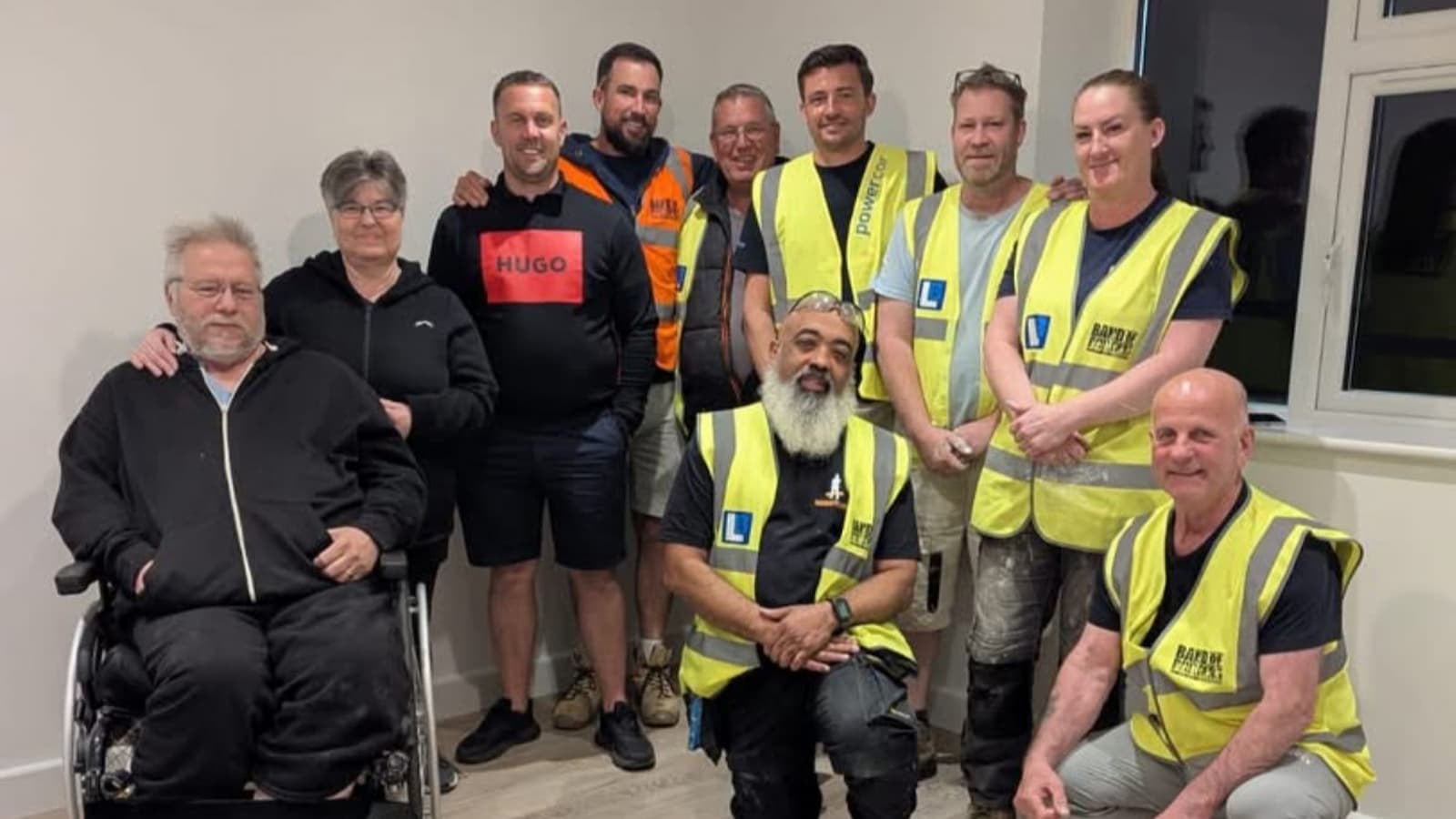Wondering how much to offer on a house to seal the deal? Here's the key steps to a successful negotiation
You’ve found the perfect house, but now comes the next challenge, how to put together an offer that can’t be refused

Some people relish the cut and thrust of negotiating the price of a home, others hate it, but it’s an unavoidable part of buying a house.
“Whether you love or loathe it, the delicate dance between buyer and seller is an inescapable part of the property market in England and Wales,” says Phil Spencer, property expert and founder of property advice website Move iQ.
To accurately gauge what a property is worth and how you should offer, you must be honest with yourself about how much you can afford to pay, how far you’re prepared to push this figure, and crucially, knowing when to walk away.
“As a buyer, the only ‘right’ price to pay is what you feel the property is worth,” says Phil.

Phil Spencer is a presenter, author, businessman and property investor. As co-presenter of the long-running Channel 4 series Location Location Location, he has become one of the best-known faces on British television and is widely regarded as an expert on all things property. Outside of television, he has published three books and founded the property advice site Move iQ.
How to establish 'how much to offer' on a house

Subscribe to Plotfinder.net to access over 15,000 building plots and properties that could become your next project
When deciding on your first offer, remember the asking price is just that – it’s what the seller, and the estate agent, working for the seller, is asking for.
Before you put in an offer, it’s vital to understand how much you can afford. You can use an online mortgage calculator to do this. However, it’s a good idea to speak to a mortgage lender or broker to get a mortgage agreed in principle. This will give you an accurate picture of what the monthly cost of your mortgage might be. It will also make you a more attractive buyer in the eyes of the seller – you’ll look serious.
Consider the seller’s position. “Put the estate agent on the spot by asking them as many questions as you can about the seller, their reason for selling and how long the property has been on the market,” advises Phil Spencer.
“Quiz them on whether there have been other offers; agents have to tell you if so, albeit not the amount they’ve offered, but how many.”
Also establish if the seller is in a hurry – ask where they are moving to and why. “Knowing these things will tell you just how hard you can push on price,” Phil adds. “And you should always put your offer in writing to avoid any confusion down the line.”

The negative effect of putting in a bid too low or too high
Bidding too low may relay that you aren’t serious. If another buyer comes along, you could lose out. “If you’ve really fallen in love with the house, don’t risk your chances by offering too low below the asking price,” says Toby Leek, president of NAEA Propertymark, a national regulatory membership body for estate agents.
Go in too high, and you’ll almost always end up paying over the odds. “Most properties are tremendously overpriced, due to deliberate overvaluation to win the instruction from estate agents,” warns Gavin Brazg, founder and CEO of TheAdvisory, a consumer advice group for home sellers.
Also, be aware that an over-the-top offer may well be challenged when the mortgage valuation survey is conducted. If you’re buying with a mortgage, this means you may have to go back and offer less if your lender refuses to agree.

Toby Leek is president of NAEA Propertymark, a national regulatory membership body for estate agents. He is also a sales manager for Laurent Residential with a history of working in the property industry across central London and Surrey.

Gavin Brazg is founder and CEO of The Advisory, the UK's oldest independent consumer advice group for home sellers. He is also creator of PropCast, the UK's first house-selling weather forecast, which provides information on the property market nationwide.
Factors to consider when deciding how much to offer
The established rule of thumb when making an offer, is to start by offering 10 per cent below the asking price, but many factors should influence the figure you put forward. These include:
- How much your budget is – Absolutely crucial. Decide what you can afford to pay
- How much work the house needs – It’s tempting to gloss over the cost of any improvements needed but be honest. Ask along tradespeople for quotations if possible
- Any problems the house has – Serious structural problems, such as the need and associated costs for a new roof or underpinning, should be considered. Gavin Brazg's top tip is to find a local RICS (Royal Institution of Chartered Surveyors) surveyor and commission a ‘valuation survey’ on the property before even submitting an offer: “This is the best way to find the ‘evidence-based’ value.”
- Other house or land values in the area – You need to play detective, using property portals or the Land Registry (free to access). “Start by identifying the last three comparable properties to have sold in the area,” advises Gavin. “Find out the asking price of the properties and their actual selling prices. Calculate the average difference between the selling price and asking price and then apply that discount when making your offer.”
- Local factors – “To get a fix on what the specific home you’re interested in is really worth, consider other factors like the school catchment area, the local crime rate, broadband speed,” says Phil Spencer. “All this information should be publicly available, but it takes legwork to find it.”
- Other buyers in the frame – A juggling act. You need to establish – as far as possible – their offer status and how quickly they would be able to proceed to purchase
- Cash purchase or mortgage? – Cash purchases are generally favoured by sellers. Mortgages are subject to strict valuation criteria
- Being in a chain – More than one in four (29 per cent) of house sales fell through between July and September this year because ‘chains’ – when three or more people are involved in a move – collapsed, according to property buying firm Quick Move Now. Chain-free buyers are favoured, but it’s no guarantee a sale will go smoothly.
- First-time buyers – FTBS are in a position of strength because they have nothing to sell, but it’s important to be ready to proceed. Mortgage finance should be in place, and a conveyancing solicitor appointed. Also, it’s important for first-timers not to over-offer to secure that all-important first home
If your offer is rejected, what are the next steps?
If your offer is rejected, explain to the estate agent how you came up with your figure. If it’s low, it could be because the home needs work, or your research reveals a local issue - or you can state with confidence (see above) the property is overpriced compared to similar homes.
How long should you wait before re-opening discussions?
Expert opinions vary. “Don’t wait too long,” says Toby Leek. “If not the same day, then certainly the following day I would suggest getting in touch with the agent again.”
But Phil Spencer likes to play a longer game: “Don’t be afraid to take your time, playing hard to get can work in your favour.”
Even if the seller is keen to sell quickly, his argument goes, you have time on your side and can remain interested without actually changing your bid. If you hold your nerve, you can negotiate without actually negotiating.
Should you make a counter offer?
Tread carefully here. The key point is to ask the estate agent if the seller has received any other offers at all. “If they haven’t, increasing your offer would mean you’re effectively bidding against yourself,” cautions Phil Spencer.
How to respond to counter offers
If the estate agent tells you that other prospective buyers have offered more than you, the seller has the winning hand, and can choose the offer most acceptable to them. It’s not just about the figure on the table, but the prospective buyer’s position; are they a cash buyer, do they have anything to sell, are they in a chain?
You should only ever offer more than the asking price if you know someone else has offered this or above, or if the property really is unsurpassable.
FAQs
Can not having your offer accepted be a good thing?
Yes, because it’s expected. “Unless you’ve offered at or close to the asking price, it’s likely your first offer will be rejected,” says Phil Spencer. “However, a first offer rejection is not necessarily a bad sign – it’s just a stage in the negotiation process.”
The key thing is to ask the estate agent why the seller rejected your initial offer. Any information you can gather will help you calibrate whether and how much to increase your offer.
Rule of thumb if you do decide to up your offer – how far should you go?
As far as you can afford. However, deciding how far is a delicate balancing act between affordability and emotion. To help rationalise, look again at the plus points of the property. Does it have ‘added value’ in comparison to similar properties, such as a kitchen extension? Or does it offer clear potential for a future increase in value? For instance, it could be a renovation property in a popular location. Pushing the boat out now financially could reap rewards should you come to sell.
If things don’t go your way when making an offer on a house, don’t panic. There are always other properties out there, so be ready to walk away if the seller isn’t open to negotiation.
But, if you're really struggling to secure the house of your dreams, why not think about renovating or extending instead? It could be that you already have options you've not yet considered. Why not weigh up the pros and cons of extension or loft conversion to see if either could be a suitable alternative to moving home.

Get the Homebuilding & Renovating Newsletter
Bring your dream home to life with expert advice, how to guides and design inspiration. Sign up for our newsletter and get two free tickets to a Homebuilding & Renovating Show near you.
